2022年外研版中考英语二轮复习话题五 天气、自然、世界与环境课件(共98张PPT)
文档属性
| 名称 | 2022年外研版中考英语二轮复习话题五 天气、自然、世界与环境课件(共98张PPT) | 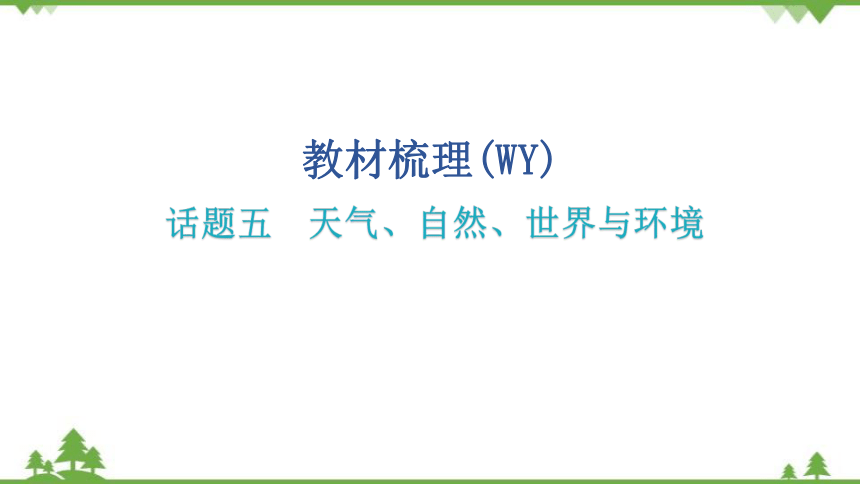 | |
| 格式 | pptx | ||
| 文件大小 | 435.5KB | ||
| 资源类型 | 教案 | ||
| 版本资源 | 外研版 | ||
| 科目 | 英语 | ||
| 更新时间 | 2022-05-26 20:08:29 | ||
图片预览

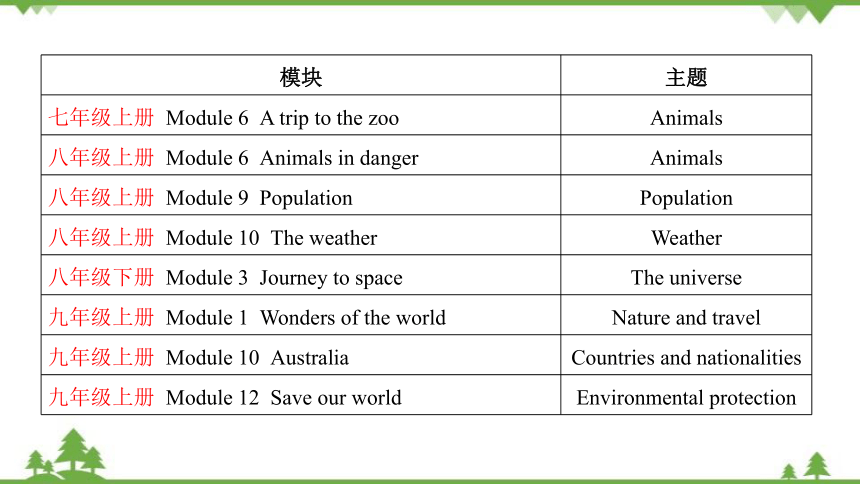
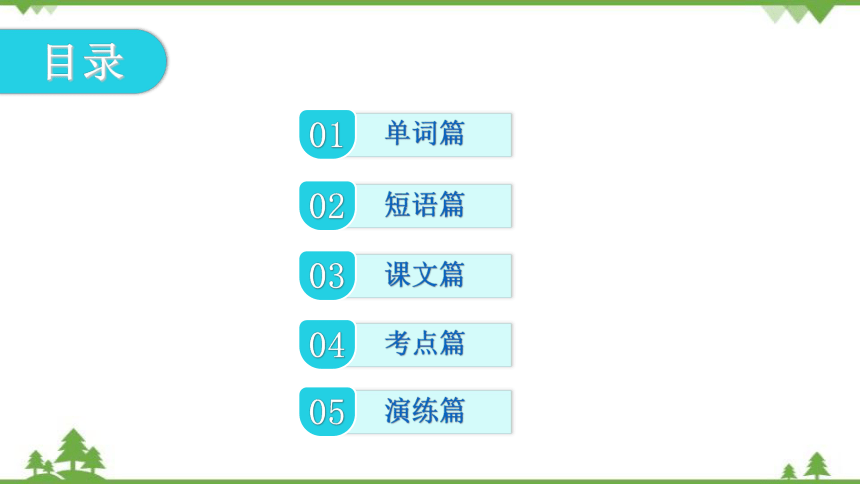
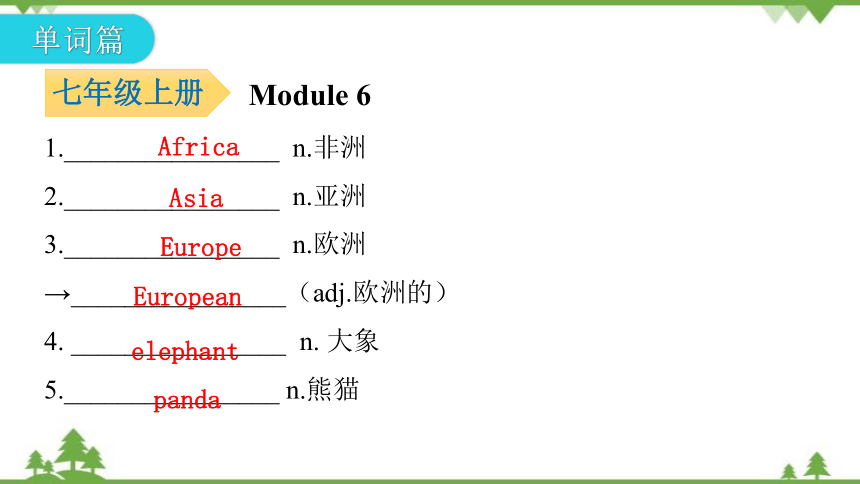
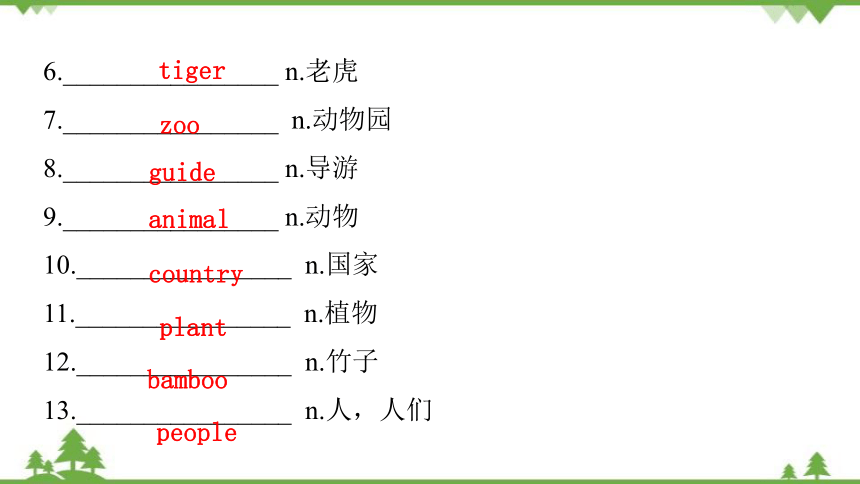
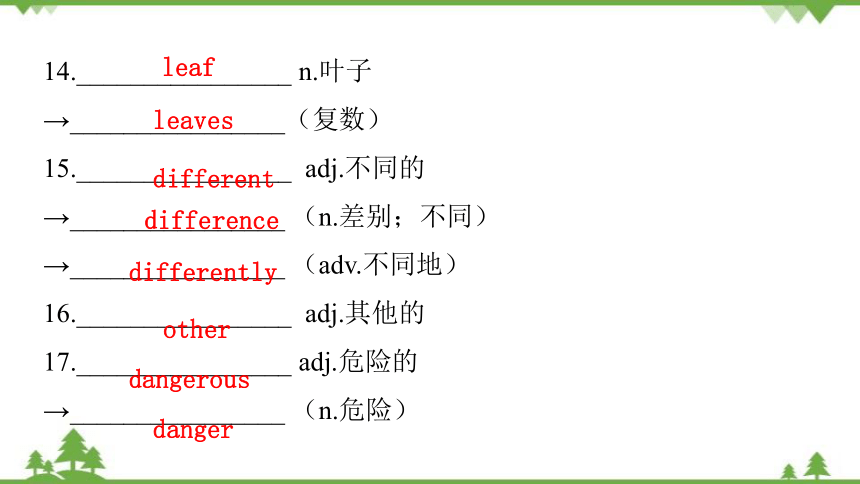
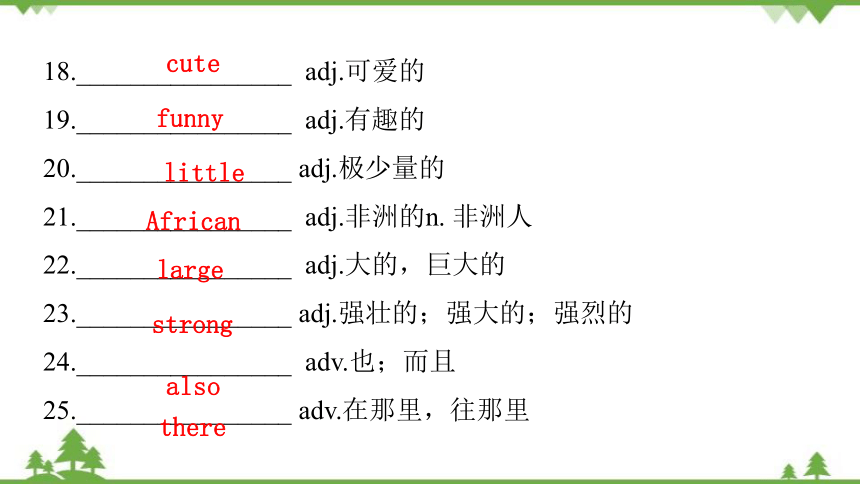
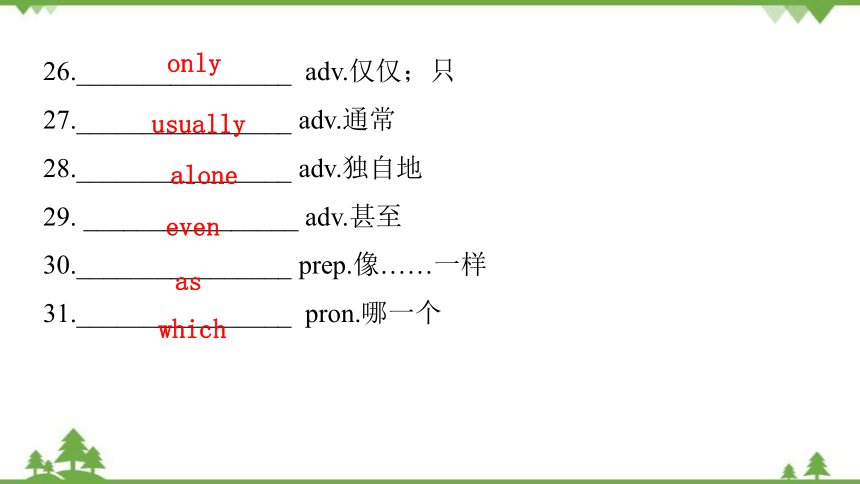
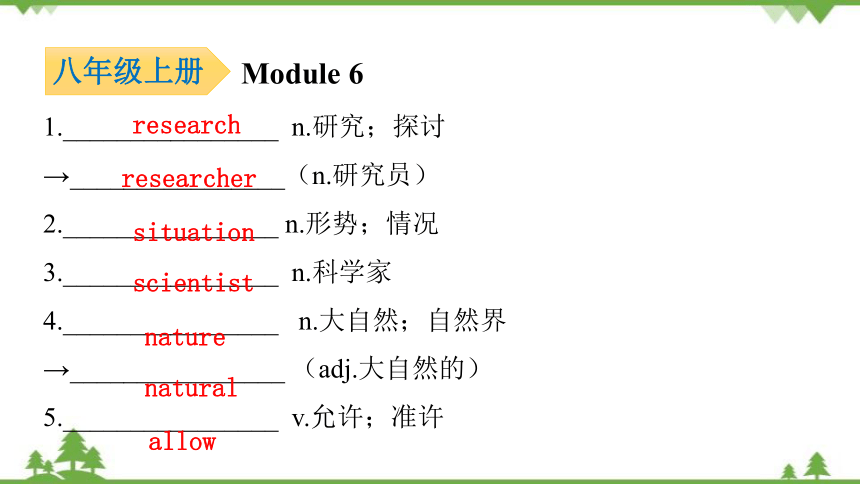
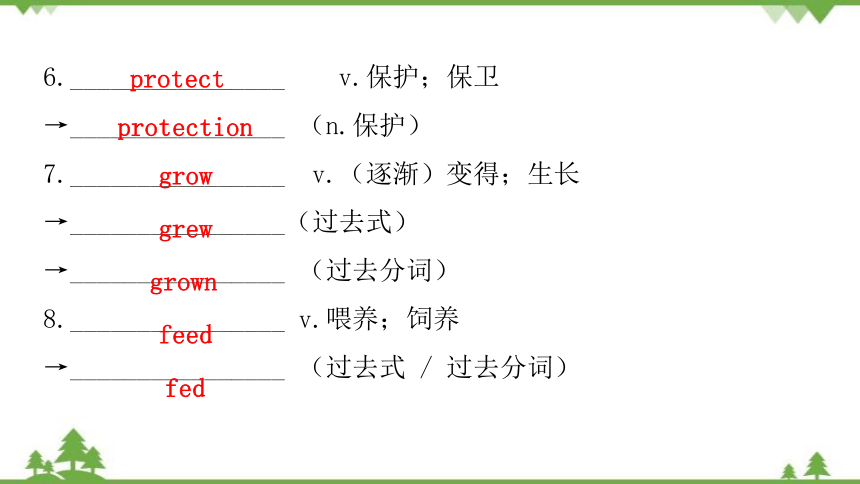
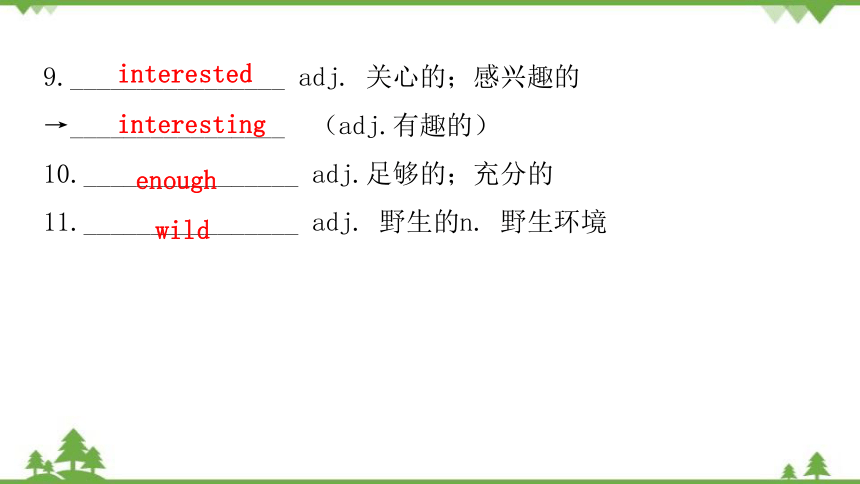
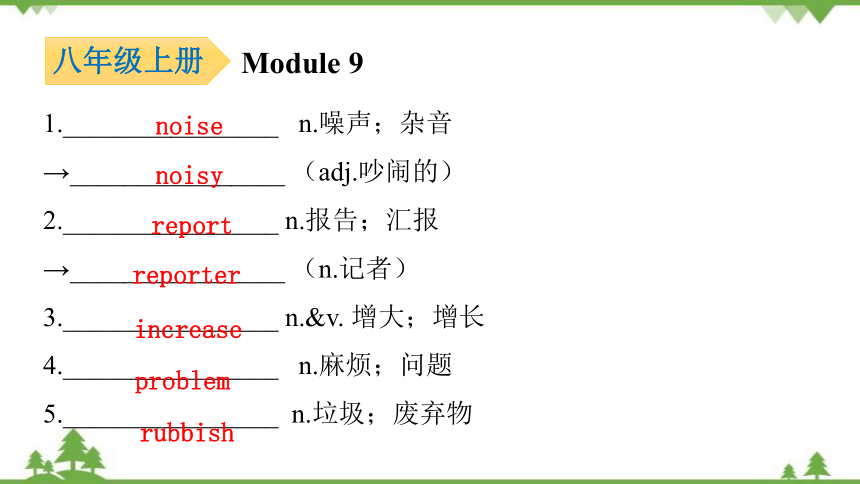
文档简介
(共98张PPT)
教材梳理(WY)
话题五 天气、自然、世界与环境
模块 主题
七年级上册 Module 6 A trip to the zoo Animals
八年级上册 Module 6 Animals in danger Animals
八年级上册 Module 9 Population Population
八年级上册 Module 10 The weather Weather
八年级下册 Module 3 Journey to space The universe
九年级上册 Module 1 Wonders of the world Nature and travel
九年级上册 Module 10 Australia Countries and nationalities
九年级上册 Module 12 Save our world Environmental protection
目录
01
单词篇
02
短语篇
03
课文篇
04
考点篇
05
演练篇
单词篇
七年级上册
Module 6
1.________________ n.非洲
2.________________ n.亚洲
3.________________ n.欧洲
→________________(adj.欧洲的)
4. ________________ n. 大象
5.________________ n.熊猫
Africa
Asia
Europe
European
elephant
panda
6.________________ n.老虎
7.________________ n.动物园
8.________________ n.导游
9.________________ n.动物
10.________________ n.国家
11.________________ n.植物
12.________________ n.竹子
13.________________ n.人,人们
tiger
zoo
guide
animal
country
plant
bamboo
people
14.________________ n.叶子
→________________(复数)
15.________________ adj.不同的
→________________ (n.差别;不同)
→________________ (adv.不同地)
16.________________ adj.其他的
17.________________ adj.危险的
→________________ (n.危险)
leaf
leaves
different
difference
differently
other
dangerous
danger
18.________________ adj.可爱的
19.________________ adj.有趣的
20.________________ adj.极少量的
21.________________ adj.非洲的n. 非洲人
22.________________ adj.大的,巨大的
23.________________ adj.强壮的;强大的;强烈的
24.________________ adv.也;而且
25.________________ adv.在那里,往那里
cute
funny
little
African
large
strong
also
there
26.________________ adv.仅仅;只
27.________________ adv.通常
28.________________ adv.独自地
29. ________________ adv.甚至
30.________________ prep.像……一样
31.________________ pron.哪一个
only
usually
alone
even
as
which
1.________________ n.研究;探讨
→________________(n.研究员)
2.________________ n.形势;情况
3.________________ n.科学家
4.________________ n.大自然;自然界
→________________ (adj.大自然的)
5.________________ v.允许;准许
八年级上册
Module 6
research
researcher
situation
scientist
nature
natural
allow
6.________________ v.保护;保卫
→________________ (n.保护)
7.________________ v.(逐渐)变得;生长
→________________(过去式)
→________________ (过去分词)
8.________________ v.喂养;饲养
→________________ (过去式 / 过去分词)
protect
protection
grow
grew
grown
feed
fed
9.________________ adj. 关心的;感兴趣的
→________________ (adj.有趣的)
10.________________ adj.足够的;充分的
11.________________ adj. 野生的n. 野生环境
interested
interesting
enough
wild
1.________________ n.噪声;杂音
→________________ (adj.吵闹的)
2.________________ n.报告;汇报
→________________ (n.记者)
3.________________ n.&v. 增大;增长
4.________________ n.麻烦;问题
5.________________ n.垃圾;废弃物
八年级上册
Module 9
noise
noisy
report
reporter
increase
problem
rubbish
6.________________ n.污染
→________________ (v.污染)
7.________________ n.公共服务;服务
8.________________ v.准备;预备
9.________________ v.增长;增大
10. ________________ v.造成;引起
11.________________ v.解决问题
pollution
pollute
service
prepare
grow
cause
solve
12.________________ adj.寂静的;安静的
→________________ (adv.安静地)
13.________________ adj.当地的;本地的
14.________________ adj.公共的;公众的
15.________________ adj.巨大的;庞大的
16.________________ num.十亿
17.________________ num.第五;五分之一
quiet
quietly
local
public
huge
billion
fifth
1.________________ n.西北adj.西北的
2.________________ n.东南adj.东南的
3.________________ n.云;云雾
→________________ (adj. 多云的)
4.________________ v.滑冰
5.________________ v.aux.可能;也许
6.________________ v.但愿;希望
八年级上册
Module 10
northwest
southeast
cloud
cloudy
skate
might
wish
7.________________ adj.多雨的;下雨的
→________________ (n.雨)
→________________ (v.下雨)
8.________________ adj. 多雪的;下雪的
→________________ (n.雪)
→________________ (v.下雪)
9.________________ adj.晴朗的
→________________ ( n.太阳)
rainy
rain
rain
snowy
snow
snow
sunny
sun
10.________________ adj.多风的;刮大风的
→________________ (n.风)
11.________________ adj.厚的
12.________________ adj. 下雨的;湿的
13.________________ adj.使人烦恼的;可怕的
→________________ (adv.非常糟地;严重地)
14.________________ adv.(某人或某事物)也不
15.________________ adv. 围绕地
16.________________ conj. 然而;尽管
windy
wind
thick
wet
terrible
terribly
neither
round
although
1.________________ n.地球
2.________________ n.新闻;消息
3.________________ n.环境
→________________ (adj.有关环境的)
4.________________ n.宇航员
5.________________ v. 到达;抵达
八年级下册
Module 3
earth
news
environment
environmental
astronaut
reach
6.________________ v.发现;找到
7.________________ v. 联系;交流
→________________ (n.交流)
8.________________ adj.最近的;最新的
9. ________________ pron.没有一人;没有一个
discover
communicate
communication
latest
none
1.________________ n.奇观;奇迹
→________________ (adj.令人惊奇的)
2.________________ n.讨论;商讨
→________________ (v.讨论)
3.________________ n.看法;主张
4.________________ n.迹象;标志;招牌
5.________________ n. 小河;小溪
九年级上册
Module 1
wonder
wonderful
discussion
discuss
opinion
sign
stream
6.________________ v. 回答;答复
7.________________ v. 逗留;留下
8.________________ adj.大自然的
9.________________ adj.在东边的;来自东边的
10.________________ adj. (声音)响亮的
→________________ (adv.响亮地)
reply
remain
natural
eastern
loud
loudly / loud
11.________________ adj.寂静的
12.________________ adv.几乎;差不多
13.________________ conj.虽然;但是
silent
nearly
though
1.________________ n.高度;身高
→________________ (adj.高的)
2.________________ n.日记;日记簿
3.________________ n. 阶段;时期
4.________________ n.关系
5.________________ n.亲戚
九年级上册
Module 10
height
high
diary
period
relationship
relative
6.________________ n.葡萄
7.________________ n.袋鼠
8.________________ n.精灵;神灵;精神
9.________________ n.骑马;乘车
10.________________ v.使保持;记录;存储(信息)
→________________ (过去式 / 过去分词)
grape
kangaroo
spirit
ride
keep
kept
11.________________ v.冲浪
12.________________ v.憎恨;讨厌
13.________________ adj.中心的;在中间的
→________________ (n.中心)
14.________________ adj.神奇的;迷人的
15.________________ adj.在东北的
16.________________ adj.懒惰的;懒散的
surf
hate
central
centre
magical
northeast
lazy
1.________________ n.制造厂;工厂
2.________________ n.废料;废弃物
3.________________ n.敌人;仇人
4.________________ n.塑料adj.塑料的
5.________________ n.政策;方针
6.________________ n.橡胶
九年级上册
Module 12
factory
waste
enemy
plastic
policy
rubber
7.________________ n.庄稼;作物
8.________________ n.步骤;措施
9.________________ v.污染
10.________________ v.回收利用,再使用(废品)
→________________ (n.回收利用)
11.________________ v.杀死;弄死
12.________________ v.分开
13.________________ v.再次使用;重复利用
crop
step
pollute
recycle
recycling
kill
divide
reuse
14.________________ v. 重说;重新做
15.________________ v.减少;减低;缩小
16.________________ adj. 较小的;较少的n.较少数
17.________________ adj.无望的
→________________ (n.希望)
18.________________ adj. 快速的;迅速的
repeat
reduce
less
hopeless
hope
rapid
短语篇
七年级上册
Module 6
1.比如 ________________
2.来自 ________________
3.看 ________________
4.擅长 ________________
5.少量 ________________
such as
come from
look at
be good at
a little
6.并且,还 ________________
7.全世界 _____________________
8.许多种类 __________________
as well as
all over the world
many kinds of
八年级上册
Module 6
1.开办;设立;创办;建立 ________________
2.终于;最后 ________________
3.想到;想出 ________________
4.夺去;拿走 ________________
set up
at last
think of
take away
5.和平地;平静地 ________________
6.照顾;照管 ________________
7.为了 ________________
8.处于危险中 ________________
in peace
look after
in order to
in danger
八年级上册
Module 9
1.[口]稍等 ________________
2.(永久)关闭;关停 ________________
3.公共服务 _____________________
4.事实上 ________________
5.为……准备…… _____________________
6.引发很多问题 __________________________
hang on
close down
public services
in fact
prepare … for …
cause a lot of problems
八年级上册
Module 10
1.有时;间或 _____________________
2.一年到头 ______________________
3.最好做某事 _______________________
4.某人随身携带某物 ______________________
5.在太平洋海岸 _______________________
6.四处转转 __________________
from time to time
all year round
had better do sth.
bring sth.with sb.
on the Pacific coast
travel around
八年级下册
Module 3
1.没问题 ________________
2.航天旅行 ________________
3.星系;(尤指)太阳系 ________________
4.数亿的 ___________________________
5.在宇宙中 ___________________
6.在地球上 ________________
no problem
space travel
solar system
hundreds of millions of
in the universe
on the earth
九年级上册
Module 1
1.据某人看来 _____________________
2.超过 ________________
3.大量的;无数的 _______________
4.穿过 ________________
5.突然向下倾斜 ________________
6.在……上面;盖住 ________________
in one’s opinion
more than
millions of
go through
fall away
on top of
九年级上册
Module 10
1.我们这就看看 ________________
2.根据;按照;据……所说 ________________
3.把某物从某物上刷掉 _____________________
4.(使)不靠近 ______________________
5.把某物从某物上剪掉 _______________________
here we go
according to
brush sth. off sth.
keep sb. / sth. away
cut sth. off sth.
6.写日记 _________________
7.那时;在那段时间 ________________
8.对……感到惊奇 _____________________
keep a diary
at the time
be surprised at
九年级上册
Module 12
1.扔掉;丢弃 ________________
2.许多;很多 ________________
3.把……分成…… _____________________
4.做出改变 ___________________
5.采取简单的措施 _____________________
throw away
tons of
divide … into …
make a change
take simple steps
6.制定政策 ____________________
7.对……有害 ____________________
8.处理 ________________
develop a policy
be harmful to …
do with
七年级上册
Module 6
1.大象生活在非洲和亚洲。
________________________________________________
2.它喜欢水,而且擅长游泳。
________________________________________________
课文篇
The elephant lives in Africa and in Asia.
The elephant lives in Africa and in Asia.
It likes water and is good at swimming.
3.它吃叶子,也吃草。
________________________________________________
4.它是一种非常大的动物,通常独自生活。
________________________________________________
5.动物园里有许多种动物,比如熊、斑马、长颈鹿和熊猫。
The zoo has ________________ animals, ________________ bears, zebras, giraffes and pandas.
It eats leaves as well as grass.
It’s a very large animal and usually lives alone.
many kinds of
such as
八年级上册
Module 6
1.许多野生动物没有安全的地方居住。
________________________________________________
2.想起大熊猫和其他濒危动物来,真让人伤心。
________________________________________________
Many wild animals don’t have a safe place to live.
It’s sad to think of pandas and other animals in danger.
3.科学家正在做许多研究来帮助熊猫繁育更多的后代,并帮助熊猫宝宝生存下来。
Scientists are doing ________________ to ___________________
_____________ and _____________________________.
a lot of research
help pandas produce
help baby pandas live
more babies
4.为了保护野生大熊猫,政府正在建造自然公园以及制定其他计划。
_____________ protect pandas_____________, the government is __________ nature parks and ____________________________.
In order to
in the wild
setting up
developing other plans
八年级上册
Module 9
1.那里交通拥挤,污染也很严重。
_____________________________________________________
2.它需要新鲜的空气、干净的水和更好的公共服务。
It needs ________________, ________________ and better ________________.
There is a lot of traffic and pollution.
fresh air
clean water
public services
3.你知道全世界每分钟有多少婴儿出生吗?
Do you know how many babies _____________________________?
4.我在为一个名为《我们不断增长的人口数量》的报告准备一些笔记。
I’m ______________________ for a report ________“Our growing population”.
are born every minute in the world
preparing some notes
called
八年级上册
Module 10
1.(加利福尼亚)全年天气都很好。
________________________________________________
2.不要忘记随身携带一件暖和的毛衣。
________________________________________________
3.慎重选择要参观的地方和去的时间。
________________________________________________
The weather is fine all year round.
Do not forget to bring a warm sweater with you.
Choose carefully the places to see and the time to go.
4.夏季和秋季时常有暴风雨。
_____________________________________________________
5.带张地图,因为你可能想四处转转。
_____________________________________________________
There are storms from time to time in summer and autumn.
Bring a map because you may want to travel around.
八年级下册
Module 3
1.你在干什么呢
_____________________________________________
2.地球是颗行星,它围绕着太阳转。
_____________________________________________
3.我们还没有在任何其他行星上发现生命。
_____________________________________________
What are you up to
The earth is a planet and it goes around the sun.
We have not found life on any other planets yet.
4.我还没开始,因为我不确定如何制作它。
___________________________________________________
5.很多科学家正努力工作,为的是有一天把宇航员送到火星上去。
Lots of scientists are working hard ________________________ to Mars ________________.
I haven’t started yet because I’m not sure how to make it.
in order to send astronauts
one day
九年级上册
Module 1
1.它宽约1700米,高约100米。
____________________________________________________
2.我到那里时是大清早,天下着雨。
____________________________________________________
3.在我看来,人造奇观比自然奇观更激动人心。
______________, ___________ wonders are more exciting than ________________.
It’s about 1,700 metres wide and 100 metres high.
When I arrived, it was early morning and it was raining.
In my opinion
man-made
natural ones
4.如果你把世界上最高的两座建筑叠在一起,然后放在大峡谷的底部,它们仍然到达不了峡谷的顶部。
If you put the two tallest buildings in the world ____________ each other ________________ the canyon, they still would not ________________.
on top of
at the bottom of
reach the top
九年级上册
Module 10
1.他们拿着的剪刀是用来剪羊毛的。
_____________________________________________________
_____________________________________________________
2.当地人认为这是一个特殊而神奇的地方。
________________ the local people, it’s a ________________ place.
The scissors that they’re holding are used to cut the wool off the sheep.
According to
special and magical
3.澳大利亚人最喜欢的食物是加了很多色拉的火腿和牛肉。
_______________________________________ are ham and beef ________________ lots of salad.
The foods that Australians like most
with
九年级上册
Module 12
1.谈论我们不能做的事情是没有用的。
_____________________________________________________
2.尽管现在污染严重,但我认为还是有希望的。
_____________________________________________________
It’s no use talking about things we can’t do.
Though pollution is heavy now, I don’t think it’s hopeless.
3.如果大家都开始采取行动,世界将会得到拯救。
If everyone __________________________________, the world ________________.
4.用陶瓷杯子和布袋更好,因为它们可以多次使用。
_______________________________________ because they can be used many times.
starts to do something
will be saved
It is better to use china cups and cloth bags
5.我们不能期待立竿见影的变化,但是让我们从今天开始采取这些简单的措施吧。
We cannot ___________________, but let’s __________________ today.
hope for rapid change
take these simple steps
考点1
行为动词的一般现在时(2)【七年级上册 Module 6】
专练 根据要求完成句子,每空一词
1.I like ice cream and chips.(用he作主语改写句子)
He ________________ ice cream and chips.
考点篇
likes
2.Carol does her homework at home.(改为否定句)
Carol ______________ ______________ her homework at home.
3.Tim plays badminton after school every Friday.(改为一般疑问句并回答)
—________________ Tim ________________ badminton after school every Friday
—Yes,__________ ___________. / No,__________ ___________.
doesn’t
do
Does
play
he
does
he
doesn’t
点拨 在一般现在时的陈述句中,当句子的主语是第三人称单数时,谓语动词也要使用第三人称单数形式。陈述句变一般疑问句时,在句首加助动词does,变否定句时,在行为动词前加doesn’t。这时,注意谓语动词要还原为动词原形。
考点2
动词不定式(2)【八年级上册 Module 6】
专练
( )1.—Mum,I am afraid that I can’t finish the job in two days.
—My boy, be brave and tell yourself ______.
A.don’t give up B.not give up
C.not to give up D.to give up
C
( )2.We should protect the wild animals and let them ________ in peace.
A.to live B.live C.lived D.living
( )3.If the pollution gets worse, the government has to do something ________ it.
A.stop B.stopped C.stopping D.to stop
B
D
点拨 (1)动词不定式可以作宾语补足语,对宾语进行补充说明。若要表达否定意思,要在to do前加not,构成not to do的形式。有些动词后接动词不定式作宾语补足语时,要将to省略,常见的这类动词有:make, let, hear, see等。(2)动词不定式还可以作目的状语,既可放在句首,也可放在句尾。
考点3
冠词和数字【八年级上册 Module 9】
专练
( )1.Now,everyone,please turn to Page ________ and look at the ________ picture.
A.Twelve; fifth B.Twelfth; fifth
C.Twelve; five D.Twelfth; five
A
( )2.—What ________ fine weather it is today!
—Yes. Let’s go for _____walk around the lake this afternoon,shall we
A./; a B.a; a C.a; / D./; /
( )3.—What do you think of this town
—Wonderful. _____ of the land ______ covered with tall buildings.
A.Two fifth;is B.Two fifth;are C.Two fifths;is D.Two fifths;are
A
C
( )4.There are ______ students in our school.
A.five hundreds B.five hundred
C.hundred of D.five hundreds of
B
点拨 (1)分数的表达:分子用基数词,分母用序数词。当分子大于1时,分母用复数形式。分数后面接的名词是否可数决定了其谓语动词的单复数。(2)hundred, thousand, million这些数词前面有具体数字时,后不加s;若这些数词后面接of表示笼统数目时,要加s。(3)表示泛指的不可数名词前用零冠词,修饰可数名词单数时则用不定冠词。
考点4
情态动词may / might表示“可能”【八年级上册 Module 10】
专练 根据句意,从方框中选择恰当的单词填空
1.It ________________ be cold this evening, so you’d better wear more clothes.
2.Jane ________________ have a lot of work to do tomorrow, but she is not sure.
may, might,possible, probably
may / might
may / might
3.It is ________________ for us to finish the task in two hours.
4.Look at the blue and clear sky.It’ll ________________ be sunny later on.
possible
probably
点拨 情态动词may或might表示可能发生某事以及某人可能做某事,其后接动词原形。possible意为“可能的”,是形容词,其副词为possibly;probably意为“很可能”,是副词,其可能性比possibly要大。
考点5
现在完成时(2)【八年级下册 Module 3】
专练 用所给单词的适当形式填空
1.Mr Miller ___________(go)to Hong Kong last month.He ________________(be)there twice.
2.I ____________ already _________ (see)the movie.I ______ (see)it the day before yesterday.
went
has been
have
seen
saw
3.—___________ he ___________(finish)his homework today
—Not yet.
Has
finished
点拨 现在完成时表示过去发生的某一动作对现在造成的影响或结果,强调现在的情况,它与现在有密切的关系。它不是从时间上就是从后果上和现在联系了起来,不能和表示具体的过去时间的状语连用。而一般过去时只表示过去的动作或状态,和现在不发生关系,可以和表示具体的过去时间的状语连用。
考点6
时态复习【九年级上册 Module 1】
Everyone makes mistakes in life. Sometimes it _1_ you are trying new things. While you _2_ new things, you are growing.
If you never have a try, you will never make progress. I remember clearly what my life was like in 2020. I was 17 years old and in a difficult situation. In a chemistry lab, I _3_ an experiment. I tried twenty times, but I couldn’t succeed, so I _4_ to stop doing it.
means
are trying
was doing
decided
I felt a little unhappy. Mr White seemed to know my feelings. He touched my head with a smile,“Young man, you _5_ a lot and you’ve got a lot. At least you know that there are twenty ways you can’t use to do this experiment.I’m sure as long as you don’t give up, you _6_.” After hearing the words, I became excited again. I kept doing the experiment and at last I succeeded.
have done
will succeed
( )1. A. mean B. means C. meant D. will mean
( )2. A. try B. tried C. are trying D. were trying
( )3. A. do B. have done C. is doing D. was doing
( )4. A. decide B. decided C. is decided D. is deciding
( )5. A. do B. did C. will do D. have done
( )6. A. succeed B. succeeded
C. will succeed D. has succeeded
B
C
D
B
D
C
点拨
时态 标志词
一般现在时 always, usually, every week / year / month等
一般过去时 yesterday, two days ago, last week / night, in 1989等
现在进行时 now, at the moment, look, listen等
过去进行时 at that time, at this time yesterday, when引导的使用一般过去时的状语从句等
一般将来时 tomorrow, in a few minutes, next week / month等
现在完成时 since+时间点, for+时间段, in the past few years等
考点7
that引导的定语从句【九年级上册 Module 10】
专练 用定语从句翻译以下句子
1.我读的第一本英文小说是《简·爱》。
The first English novel ________________ was Jane Eyre.
2.这是我看过的最激动人心的足球比赛之一。
This is one of the most exciting football games
____________________________________.
(that) I read
(that) I have ever watched
3.坐在树下的那个姑娘是很好的赛跑运动员。
The girl ________________________________ is a good runner.
that / who is sitting under the tree
点拨 that引导的定语从句既可以修饰人,也可以修饰物。that在从句中作主语或宾语,作主语时不可省略,作宾语时可以省略。
考点8
构词法【九年级上册 Module 12】
专练 用所给单词的适当形式填空
1.Listen to a piece of light music and you will feel _____________(relax).
2.Thanks to the ________________(invent) of the smartphone, it’s convenient to communicate with our friends anytime.
3.We’re really ____________(luck) to live in such a powerful and peaceful country.
relaxed
invention
lucky
点拨 构词法中-ed可表示人的情感,通常由动词派生而成;-tion表示动作、状态,通常为名词后缀;-y表示性质,通常为形容词后缀。
演练篇
一、语法选择
Saving electricity and water is important in our life.There are _1_ little things for us to do at home to help save the earth.They’re small, but _2_ people do the same things and make a great _3_. By making some small changes to the way you do things at home, you are _4_our planet day by day.
You can spend _5_ and improve your health better at the same time, so helping to save the environment _6_ good exercise!
many
thousands of
difference
helping
less
is
You can use windows to make the house good to live in.You can keep windows and doors _7_ to keep the house warm in winter. Open them in summer,and the wind will often keep you as cool as _8_ the open air.
And you must do something _9_ water.The water that you use in the kitchen can also be used to wash the rice or water the flowers, and it’s very good for _10_.Please always remember to turn off the lights when you leave.
closed
in
to save
them
( )1.A.much B.many C.more D.most
( )2.A.thousand B.thousands
C.thousand of D.thousands of
( )3.A.different B.differently C.difference D.differences
( )4.A.help B.helps C.helped D.helping
( )5.A.less B.little C.least D.a little
B
D
C
D
A
( )6.A.was B.is C.were D.are
( )7.A.close B.to close C.closed D.be closed
( )8.A.at B.in C.by D.on
( )9.A.save B.saved C.saving D.to save
( )10.A.they B.their C.them D.theirs
B
C
B
D
C
二、阅读理解(B篇)
On 12th October, China set up the first group of national parks. Let’s see what the features are of these national parks.
The Three-River-Source National Park, covering an area of 123,100 square km, is located in Qinghai Province. Known as the “water tower of China”, it is home to the headwaters of the Yangtze, Yellow and Lancang rivers. Rare wild animals such as Tibetan antelope and snow leopard have lived here for generations.
The Giant Panda National Park and the Northeast Tiger and Leopard National Park protect endangered animals. The Giant Panda National Park, covering 27,134 square km, spans(跨越) parts of Sichuan, Shaanxi and Gansu provinces. It protects the major habitats(栖息地)of 70 percent of the country’s wild giant pandas. The Northeast China Tiger and Leopard National Park covers an area of 14,600 square km. It is the major habitat of the country’s Siberian tiger and Amur leopard.
Covering an area of 4,400 square km, the Hainan Tropical Rainforest National Park is home to China’s largest rainforest and the Hainan gibbon. The park preserves(保存)China’s most complete rainforest.
Located in East China’s Fujian Province and covering about 1,001 square km, the Wuyishan National Park is a treasure home of flora and fauna(动植物群)in Southeast China.
( )11.The number of China’s first group of national parks is ______.
A. 3 B. 4 C. 5 D. 6
( )12.The Three-River-Source National Park is called “water tower of China” possibly because ______.
A. it has three rivers B. it has many water towers
C. it is rich in water resources D. it is famous for its water towers
C
C
( )13.The underlined word “rare” means ______.
A. different B. valuable
C. cute D. normal
B
( )14.From the third paragraph, we know that ______.
A. the Giant Panda National Park is in Sichuan Province only
B. the Giant Panda National Park covers parts of three provinces
C. some snow leopards live in the Northeast China Tiger and Leopard National Park
D. the Giant Panda National Park is smaller than the Northeast China Tiger and Leopard National Park
B
( )15.This passage is most probably from ______.
A. a dairy B. a scientific report
C. a travel guide D. a newspaper
D
三、回答问题
请阅读下面这篇文章,根据所提供的信息,回答5个问题。要求所写答案语法正确、语义完整,并把答案写在横线上。
People already know a lot about animals. However, here are still some things that may surprise you. You probably didn’t know these facts about animals.
续表
Cows do have best fiends and feel stressed when hey are separated. Scientists have found that cows are very social animals and a cow always makes friends with other cows. When a cow is with its friends, it feels relaxed, compared with when it is alone.
During the breeding (繁殖) season, a male penguin will offer a small stone to a female penguin as a gift. If she takes it, they will become partners. When the female penguin lays an egg, she
续表
and her partner may carry it on their feet, because some penguins don’t build nests.
Crocodiles swallow (吞) stones. Crocodiles always swallow their food instead of eating it like other animals. They swallow stones which break the food into very small pieces in their stomachs. These stones may stay in their stomachs all their lives.
续表
Elephants use plants to treat pain or other illnesses. Scientists once found a pregnant (怀孕的)elephant in Africa eat a kind of plant which was not part of her normal food. Four days later, she gave birth to a baby elephant. The same plant was used by the local pregnant women.
16.How does a cow feel when it is with its friends
_____________________________________________________
17.What will a male penguin offer to a female penguin during the breeding season
_____________________________________________________
_____________________________________________________
18.Which kind of animal swallows stones
_____________________________________________________
A cow / It feels relaxed when it is with its friends.
A male penguin will offer a small stone to a female penguin during the breeding season. / A small stone.
Crocodiles swallow stones. / Crocodiles.
19.What will elephants use to treat pain or other illnesses
_____________________________________________________
_____________________________________________________
20.How many kinds of animals are mentioned in the passage
_____________________________________________________
_____________________________________________________
Elephants will use plants to treat pain or other illnesses. / Plants.
Four / 4 kinds of animals are mentioned in the passage. / Four / 4.
谢 谢!
教材梳理(WY)
话题五 天气、自然、世界与环境
模块 主题
七年级上册 Module 6 A trip to the zoo Animals
八年级上册 Module 6 Animals in danger Animals
八年级上册 Module 9 Population Population
八年级上册 Module 10 The weather Weather
八年级下册 Module 3 Journey to space The universe
九年级上册 Module 1 Wonders of the world Nature and travel
九年级上册 Module 10 Australia Countries and nationalities
九年级上册 Module 12 Save our world Environmental protection
目录
01
单词篇
02
短语篇
03
课文篇
04
考点篇
05
演练篇
单词篇
七年级上册
Module 6
1.________________ n.非洲
2.________________ n.亚洲
3.________________ n.欧洲
→________________(adj.欧洲的)
4. ________________ n. 大象
5.________________ n.熊猫
Africa
Asia
Europe
European
elephant
panda
6.________________ n.老虎
7.________________ n.动物园
8.________________ n.导游
9.________________ n.动物
10.________________ n.国家
11.________________ n.植物
12.________________ n.竹子
13.________________ n.人,人们
tiger
zoo
guide
animal
country
plant
bamboo
people
14.________________ n.叶子
→________________(复数)
15.________________ adj.不同的
→________________ (n.差别;不同)
→________________ (adv.不同地)
16.________________ adj.其他的
17.________________ adj.危险的
→________________ (n.危险)
leaf
leaves
different
difference
differently
other
dangerous
danger
18.________________ adj.可爱的
19.________________ adj.有趣的
20.________________ adj.极少量的
21.________________ adj.非洲的n. 非洲人
22.________________ adj.大的,巨大的
23.________________ adj.强壮的;强大的;强烈的
24.________________ adv.也;而且
25.________________ adv.在那里,往那里
cute
funny
little
African
large
strong
also
there
26.________________ adv.仅仅;只
27.________________ adv.通常
28.________________ adv.独自地
29. ________________ adv.甚至
30.________________ prep.像……一样
31.________________ pron.哪一个
only
usually
alone
even
as
which
1.________________ n.研究;探讨
→________________(n.研究员)
2.________________ n.形势;情况
3.________________ n.科学家
4.________________ n.大自然;自然界
→________________ (adj.大自然的)
5.________________ v.允许;准许
八年级上册
Module 6
research
researcher
situation
scientist
nature
natural
allow
6.________________ v.保护;保卫
→________________ (n.保护)
7.________________ v.(逐渐)变得;生长
→________________(过去式)
→________________ (过去分词)
8.________________ v.喂养;饲养
→________________ (过去式 / 过去分词)
protect
protection
grow
grew
grown
feed
fed
9.________________ adj. 关心的;感兴趣的
→________________ (adj.有趣的)
10.________________ adj.足够的;充分的
11.________________ adj. 野生的n. 野生环境
interested
interesting
enough
wild
1.________________ n.噪声;杂音
→________________ (adj.吵闹的)
2.________________ n.报告;汇报
→________________ (n.记者)
3.________________ n.&v. 增大;增长
4.________________ n.麻烦;问题
5.________________ n.垃圾;废弃物
八年级上册
Module 9
noise
noisy
report
reporter
increase
problem
rubbish
6.________________ n.污染
→________________ (v.污染)
7.________________ n.公共服务;服务
8.________________ v.准备;预备
9.________________ v.增长;增大
10. ________________ v.造成;引起
11.________________ v.解决问题
pollution
pollute
service
prepare
grow
cause
solve
12.________________ adj.寂静的;安静的
→________________ (adv.安静地)
13.________________ adj.当地的;本地的
14.________________ adj.公共的;公众的
15.________________ adj.巨大的;庞大的
16.________________ num.十亿
17.________________ num.第五;五分之一
quiet
quietly
local
public
huge
billion
fifth
1.________________ n.西北adj.西北的
2.________________ n.东南adj.东南的
3.________________ n.云;云雾
→________________ (adj. 多云的)
4.________________ v.滑冰
5.________________ v.aux.可能;也许
6.________________ v.但愿;希望
八年级上册
Module 10
northwest
southeast
cloud
cloudy
skate
might
wish
7.________________ adj.多雨的;下雨的
→________________ (n.雨)
→________________ (v.下雨)
8.________________ adj. 多雪的;下雪的
→________________ (n.雪)
→________________ (v.下雪)
9.________________ adj.晴朗的
→________________ ( n.太阳)
rainy
rain
rain
snowy
snow
snow
sunny
sun
10.________________ adj.多风的;刮大风的
→________________ (n.风)
11.________________ adj.厚的
12.________________ adj. 下雨的;湿的
13.________________ adj.使人烦恼的;可怕的
→________________ (adv.非常糟地;严重地)
14.________________ adv.(某人或某事物)也不
15.________________ adv. 围绕地
16.________________ conj. 然而;尽管
windy
wind
thick
wet
terrible
terribly
neither
round
although
1.________________ n.地球
2.________________ n.新闻;消息
3.________________ n.环境
→________________ (adj.有关环境的)
4.________________ n.宇航员
5.________________ v. 到达;抵达
八年级下册
Module 3
earth
news
environment
environmental
astronaut
reach
6.________________ v.发现;找到
7.________________ v. 联系;交流
→________________ (n.交流)
8.________________ adj.最近的;最新的
9. ________________ pron.没有一人;没有一个
discover
communicate
communication
latest
none
1.________________ n.奇观;奇迹
→________________ (adj.令人惊奇的)
2.________________ n.讨论;商讨
→________________ (v.讨论)
3.________________ n.看法;主张
4.________________ n.迹象;标志;招牌
5.________________ n. 小河;小溪
九年级上册
Module 1
wonder
wonderful
discussion
discuss
opinion
sign
stream
6.________________ v. 回答;答复
7.________________ v. 逗留;留下
8.________________ adj.大自然的
9.________________ adj.在东边的;来自东边的
10.________________ adj. (声音)响亮的
→________________ (adv.响亮地)
reply
remain
natural
eastern
loud
loudly / loud
11.________________ adj.寂静的
12.________________ adv.几乎;差不多
13.________________ conj.虽然;但是
silent
nearly
though
1.________________ n.高度;身高
→________________ (adj.高的)
2.________________ n.日记;日记簿
3.________________ n. 阶段;时期
4.________________ n.关系
5.________________ n.亲戚
九年级上册
Module 10
height
high
diary
period
relationship
relative
6.________________ n.葡萄
7.________________ n.袋鼠
8.________________ n.精灵;神灵;精神
9.________________ n.骑马;乘车
10.________________ v.使保持;记录;存储(信息)
→________________ (过去式 / 过去分词)
grape
kangaroo
spirit
ride
keep
kept
11.________________ v.冲浪
12.________________ v.憎恨;讨厌
13.________________ adj.中心的;在中间的
→________________ (n.中心)
14.________________ adj.神奇的;迷人的
15.________________ adj.在东北的
16.________________ adj.懒惰的;懒散的
surf
hate
central
centre
magical
northeast
lazy
1.________________ n.制造厂;工厂
2.________________ n.废料;废弃物
3.________________ n.敌人;仇人
4.________________ n.塑料adj.塑料的
5.________________ n.政策;方针
6.________________ n.橡胶
九年级上册
Module 12
factory
waste
enemy
plastic
policy
rubber
7.________________ n.庄稼;作物
8.________________ n.步骤;措施
9.________________ v.污染
10.________________ v.回收利用,再使用(废品)
→________________ (n.回收利用)
11.________________ v.杀死;弄死
12.________________ v.分开
13.________________ v.再次使用;重复利用
crop
step
pollute
recycle
recycling
kill
divide
reuse
14.________________ v. 重说;重新做
15.________________ v.减少;减低;缩小
16.________________ adj. 较小的;较少的n.较少数
17.________________ adj.无望的
→________________ (n.希望)
18.________________ adj. 快速的;迅速的
repeat
reduce
less
hopeless
hope
rapid
短语篇
七年级上册
Module 6
1.比如 ________________
2.来自 ________________
3.看 ________________
4.擅长 ________________
5.少量 ________________
such as
come from
look at
be good at
a little
6.并且,还 ________________
7.全世界 _____________________
8.许多种类 __________________
as well as
all over the world
many kinds of
八年级上册
Module 6
1.开办;设立;创办;建立 ________________
2.终于;最后 ________________
3.想到;想出 ________________
4.夺去;拿走 ________________
set up
at last
think of
take away
5.和平地;平静地 ________________
6.照顾;照管 ________________
7.为了 ________________
8.处于危险中 ________________
in peace
look after
in order to
in danger
八年级上册
Module 9
1.[口]稍等 ________________
2.(永久)关闭;关停 ________________
3.公共服务 _____________________
4.事实上 ________________
5.为……准备…… _____________________
6.引发很多问题 __________________________
hang on
close down
public services
in fact
prepare … for …
cause a lot of problems
八年级上册
Module 10
1.有时;间或 _____________________
2.一年到头 ______________________
3.最好做某事 _______________________
4.某人随身携带某物 ______________________
5.在太平洋海岸 _______________________
6.四处转转 __________________
from time to time
all year round
had better do sth.
bring sth.with sb.
on the Pacific coast
travel around
八年级下册
Module 3
1.没问题 ________________
2.航天旅行 ________________
3.星系;(尤指)太阳系 ________________
4.数亿的 ___________________________
5.在宇宙中 ___________________
6.在地球上 ________________
no problem
space travel
solar system
hundreds of millions of
in the universe
on the earth
九年级上册
Module 1
1.据某人看来 _____________________
2.超过 ________________
3.大量的;无数的 _______________
4.穿过 ________________
5.突然向下倾斜 ________________
6.在……上面;盖住 ________________
in one’s opinion
more than
millions of
go through
fall away
on top of
九年级上册
Module 10
1.我们这就看看 ________________
2.根据;按照;据……所说 ________________
3.把某物从某物上刷掉 _____________________
4.(使)不靠近 ______________________
5.把某物从某物上剪掉 _______________________
here we go
according to
brush sth. off sth.
keep sb. / sth. away
cut sth. off sth.
6.写日记 _________________
7.那时;在那段时间 ________________
8.对……感到惊奇 _____________________
keep a diary
at the time
be surprised at
九年级上册
Module 12
1.扔掉;丢弃 ________________
2.许多;很多 ________________
3.把……分成…… _____________________
4.做出改变 ___________________
5.采取简单的措施 _____________________
throw away
tons of
divide … into …
make a change
take simple steps
6.制定政策 ____________________
7.对……有害 ____________________
8.处理 ________________
develop a policy
be harmful to …
do with
七年级上册
Module 6
1.大象生活在非洲和亚洲。
________________________________________________
2.它喜欢水,而且擅长游泳。
________________________________________________
课文篇
The elephant lives in Africa and in Asia.
The elephant lives in Africa and in Asia.
It likes water and is good at swimming.
3.它吃叶子,也吃草。
________________________________________________
4.它是一种非常大的动物,通常独自生活。
________________________________________________
5.动物园里有许多种动物,比如熊、斑马、长颈鹿和熊猫。
The zoo has ________________ animals, ________________ bears, zebras, giraffes and pandas.
It eats leaves as well as grass.
It’s a very large animal and usually lives alone.
many kinds of
such as
八年级上册
Module 6
1.许多野生动物没有安全的地方居住。
________________________________________________
2.想起大熊猫和其他濒危动物来,真让人伤心。
________________________________________________
Many wild animals don’t have a safe place to live.
It’s sad to think of pandas and other animals in danger.
3.科学家正在做许多研究来帮助熊猫繁育更多的后代,并帮助熊猫宝宝生存下来。
Scientists are doing ________________ to ___________________
_____________ and _____________________________.
a lot of research
help pandas produce
help baby pandas live
more babies
4.为了保护野生大熊猫,政府正在建造自然公园以及制定其他计划。
_____________ protect pandas_____________, the government is __________ nature parks and ____________________________.
In order to
in the wild
setting up
developing other plans
八年级上册
Module 9
1.那里交通拥挤,污染也很严重。
_____________________________________________________
2.它需要新鲜的空气、干净的水和更好的公共服务。
It needs ________________, ________________ and better ________________.
There is a lot of traffic and pollution.
fresh air
clean water
public services
3.你知道全世界每分钟有多少婴儿出生吗?
Do you know how many babies _____________________________?
4.我在为一个名为《我们不断增长的人口数量》的报告准备一些笔记。
I’m ______________________ for a report ________“Our growing population”.
are born every minute in the world
preparing some notes
called
八年级上册
Module 10
1.(加利福尼亚)全年天气都很好。
________________________________________________
2.不要忘记随身携带一件暖和的毛衣。
________________________________________________
3.慎重选择要参观的地方和去的时间。
________________________________________________
The weather is fine all year round.
Do not forget to bring a warm sweater with you.
Choose carefully the places to see and the time to go.
4.夏季和秋季时常有暴风雨。
_____________________________________________________
5.带张地图,因为你可能想四处转转。
_____________________________________________________
There are storms from time to time in summer and autumn.
Bring a map because you may want to travel around.
八年级下册
Module 3
1.你在干什么呢
_____________________________________________
2.地球是颗行星,它围绕着太阳转。
_____________________________________________
3.我们还没有在任何其他行星上发现生命。
_____________________________________________
What are you up to
The earth is a planet and it goes around the sun.
We have not found life on any other planets yet.
4.我还没开始,因为我不确定如何制作它。
___________________________________________________
5.很多科学家正努力工作,为的是有一天把宇航员送到火星上去。
Lots of scientists are working hard ________________________ to Mars ________________.
I haven’t started yet because I’m not sure how to make it.
in order to send astronauts
one day
九年级上册
Module 1
1.它宽约1700米,高约100米。
____________________________________________________
2.我到那里时是大清早,天下着雨。
____________________________________________________
3.在我看来,人造奇观比自然奇观更激动人心。
______________, ___________ wonders are more exciting than ________________.
It’s about 1,700 metres wide and 100 metres high.
When I arrived, it was early morning and it was raining.
In my opinion
man-made
natural ones
4.如果你把世界上最高的两座建筑叠在一起,然后放在大峡谷的底部,它们仍然到达不了峡谷的顶部。
If you put the two tallest buildings in the world ____________ each other ________________ the canyon, they still would not ________________.
on top of
at the bottom of
reach the top
九年级上册
Module 10
1.他们拿着的剪刀是用来剪羊毛的。
_____________________________________________________
_____________________________________________________
2.当地人认为这是一个特殊而神奇的地方。
________________ the local people, it’s a ________________ place.
The scissors that they’re holding are used to cut the wool off the sheep.
According to
special and magical
3.澳大利亚人最喜欢的食物是加了很多色拉的火腿和牛肉。
_______________________________________ are ham and beef ________________ lots of salad.
The foods that Australians like most
with
九年级上册
Module 12
1.谈论我们不能做的事情是没有用的。
_____________________________________________________
2.尽管现在污染严重,但我认为还是有希望的。
_____________________________________________________
It’s no use talking about things we can’t do.
Though pollution is heavy now, I don’t think it’s hopeless.
3.如果大家都开始采取行动,世界将会得到拯救。
If everyone __________________________________, the world ________________.
4.用陶瓷杯子和布袋更好,因为它们可以多次使用。
_______________________________________ because they can be used many times.
starts to do something
will be saved
It is better to use china cups and cloth bags
5.我们不能期待立竿见影的变化,但是让我们从今天开始采取这些简单的措施吧。
We cannot ___________________, but let’s __________________ today.
hope for rapid change
take these simple steps
考点1
行为动词的一般现在时(2)【七年级上册 Module 6】
专练 根据要求完成句子,每空一词
1.I like ice cream and chips.(用he作主语改写句子)
He ________________ ice cream and chips.
考点篇
likes
2.Carol does her homework at home.(改为否定句)
Carol ______________ ______________ her homework at home.
3.Tim plays badminton after school every Friday.(改为一般疑问句并回答)
—________________ Tim ________________ badminton after school every Friday
—Yes,__________ ___________. / No,__________ ___________.
doesn’t
do
Does
play
he
does
he
doesn’t
点拨 在一般现在时的陈述句中,当句子的主语是第三人称单数时,谓语动词也要使用第三人称单数形式。陈述句变一般疑问句时,在句首加助动词does,变否定句时,在行为动词前加doesn’t。这时,注意谓语动词要还原为动词原形。
考点2
动词不定式(2)【八年级上册 Module 6】
专练
( )1.—Mum,I am afraid that I can’t finish the job in two days.
—My boy, be brave and tell yourself ______.
A.don’t give up B.not give up
C.not to give up D.to give up
C
( )2.We should protect the wild animals and let them ________ in peace.
A.to live B.live C.lived D.living
( )3.If the pollution gets worse, the government has to do something ________ it.
A.stop B.stopped C.stopping D.to stop
B
D
点拨 (1)动词不定式可以作宾语补足语,对宾语进行补充说明。若要表达否定意思,要在to do前加not,构成not to do的形式。有些动词后接动词不定式作宾语补足语时,要将to省略,常见的这类动词有:make, let, hear, see等。(2)动词不定式还可以作目的状语,既可放在句首,也可放在句尾。
考点3
冠词和数字【八年级上册 Module 9】
专练
( )1.Now,everyone,please turn to Page ________ and look at the ________ picture.
A.Twelve; fifth B.Twelfth; fifth
C.Twelve; five D.Twelfth; five
A
( )2.—What ________ fine weather it is today!
—Yes. Let’s go for _____walk around the lake this afternoon,shall we
A./; a B.a; a C.a; / D./; /
( )3.—What do you think of this town
—Wonderful. _____ of the land ______ covered with tall buildings.
A.Two fifth;is B.Two fifth;are C.Two fifths;is D.Two fifths;are
A
C
( )4.There are ______ students in our school.
A.five hundreds B.five hundred
C.hundred of D.five hundreds of
B
点拨 (1)分数的表达:分子用基数词,分母用序数词。当分子大于1时,分母用复数形式。分数后面接的名词是否可数决定了其谓语动词的单复数。(2)hundred, thousand, million这些数词前面有具体数字时,后不加s;若这些数词后面接of表示笼统数目时,要加s。(3)表示泛指的不可数名词前用零冠词,修饰可数名词单数时则用不定冠词。
考点4
情态动词may / might表示“可能”【八年级上册 Module 10】
专练 根据句意,从方框中选择恰当的单词填空
1.It ________________ be cold this evening, so you’d better wear more clothes.
2.Jane ________________ have a lot of work to do tomorrow, but she is not sure.
may, might,possible, probably
may / might
may / might
3.It is ________________ for us to finish the task in two hours.
4.Look at the blue and clear sky.It’ll ________________ be sunny later on.
possible
probably
点拨 情态动词may或might表示可能发生某事以及某人可能做某事,其后接动词原形。possible意为“可能的”,是形容词,其副词为possibly;probably意为“很可能”,是副词,其可能性比possibly要大。
考点5
现在完成时(2)【八年级下册 Module 3】
专练 用所给单词的适当形式填空
1.Mr Miller ___________(go)to Hong Kong last month.He ________________(be)there twice.
2.I ____________ already _________ (see)the movie.I ______ (see)it the day before yesterday.
went
has been
have
seen
saw
3.—___________ he ___________(finish)his homework today
—Not yet.
Has
finished
点拨 现在完成时表示过去发生的某一动作对现在造成的影响或结果,强调现在的情况,它与现在有密切的关系。它不是从时间上就是从后果上和现在联系了起来,不能和表示具体的过去时间的状语连用。而一般过去时只表示过去的动作或状态,和现在不发生关系,可以和表示具体的过去时间的状语连用。
考点6
时态复习【九年级上册 Module 1】
Everyone makes mistakes in life. Sometimes it _1_ you are trying new things. While you _2_ new things, you are growing.
If you never have a try, you will never make progress. I remember clearly what my life was like in 2020. I was 17 years old and in a difficult situation. In a chemistry lab, I _3_ an experiment. I tried twenty times, but I couldn’t succeed, so I _4_ to stop doing it.
means
are trying
was doing
decided
I felt a little unhappy. Mr White seemed to know my feelings. He touched my head with a smile,“Young man, you _5_ a lot and you’ve got a lot. At least you know that there are twenty ways you can’t use to do this experiment.I’m sure as long as you don’t give up, you _6_.” After hearing the words, I became excited again. I kept doing the experiment and at last I succeeded.
have done
will succeed
( )1. A. mean B. means C. meant D. will mean
( )2. A. try B. tried C. are trying D. were trying
( )3. A. do B. have done C. is doing D. was doing
( )4. A. decide B. decided C. is decided D. is deciding
( )5. A. do B. did C. will do D. have done
( )6. A. succeed B. succeeded
C. will succeed D. has succeeded
B
C
D
B
D
C
点拨
时态 标志词
一般现在时 always, usually, every week / year / month等
一般过去时 yesterday, two days ago, last week / night, in 1989等
现在进行时 now, at the moment, look, listen等
过去进行时 at that time, at this time yesterday, when引导的使用一般过去时的状语从句等
一般将来时 tomorrow, in a few minutes, next week / month等
现在完成时 since+时间点, for+时间段, in the past few years等
考点7
that引导的定语从句【九年级上册 Module 10】
专练 用定语从句翻译以下句子
1.我读的第一本英文小说是《简·爱》。
The first English novel ________________ was Jane Eyre.
2.这是我看过的最激动人心的足球比赛之一。
This is one of the most exciting football games
____________________________________.
(that) I read
(that) I have ever watched
3.坐在树下的那个姑娘是很好的赛跑运动员。
The girl ________________________________ is a good runner.
that / who is sitting under the tree
点拨 that引导的定语从句既可以修饰人,也可以修饰物。that在从句中作主语或宾语,作主语时不可省略,作宾语时可以省略。
考点8
构词法【九年级上册 Module 12】
专练 用所给单词的适当形式填空
1.Listen to a piece of light music and you will feel _____________(relax).
2.Thanks to the ________________(invent) of the smartphone, it’s convenient to communicate with our friends anytime.
3.We’re really ____________(luck) to live in such a powerful and peaceful country.
relaxed
invention
lucky
点拨 构词法中-ed可表示人的情感,通常由动词派生而成;-tion表示动作、状态,通常为名词后缀;-y表示性质,通常为形容词后缀。
演练篇
一、语法选择
Saving electricity and water is important in our life.There are _1_ little things for us to do at home to help save the earth.They’re small, but _2_ people do the same things and make a great _3_. By making some small changes to the way you do things at home, you are _4_our planet day by day.
You can spend _5_ and improve your health better at the same time, so helping to save the environment _6_ good exercise!
many
thousands of
difference
helping
less
is
You can use windows to make the house good to live in.You can keep windows and doors _7_ to keep the house warm in winter. Open them in summer,and the wind will often keep you as cool as _8_ the open air.
And you must do something _9_ water.The water that you use in the kitchen can also be used to wash the rice or water the flowers, and it’s very good for _10_.Please always remember to turn off the lights when you leave.
closed
in
to save
them
( )1.A.much B.many C.more D.most
( )2.A.thousand B.thousands
C.thousand of D.thousands of
( )3.A.different B.differently C.difference D.differences
( )4.A.help B.helps C.helped D.helping
( )5.A.less B.little C.least D.a little
B
D
C
D
A
( )6.A.was B.is C.were D.are
( )7.A.close B.to close C.closed D.be closed
( )8.A.at B.in C.by D.on
( )9.A.save B.saved C.saving D.to save
( )10.A.they B.their C.them D.theirs
B
C
B
D
C
二、阅读理解(B篇)
On 12th October, China set up the first group of national parks. Let’s see what the features are of these national parks.
The Three-River-Source National Park, covering an area of 123,100 square km, is located in Qinghai Province. Known as the “water tower of China”, it is home to the headwaters of the Yangtze, Yellow and Lancang rivers. Rare wild animals such as Tibetan antelope and snow leopard have lived here for generations.
The Giant Panda National Park and the Northeast Tiger and Leopard National Park protect endangered animals. The Giant Panda National Park, covering 27,134 square km, spans(跨越) parts of Sichuan, Shaanxi and Gansu provinces. It protects the major habitats(栖息地)of 70 percent of the country’s wild giant pandas. The Northeast China Tiger and Leopard National Park covers an area of 14,600 square km. It is the major habitat of the country’s Siberian tiger and Amur leopard.
Covering an area of 4,400 square km, the Hainan Tropical Rainforest National Park is home to China’s largest rainforest and the Hainan gibbon. The park preserves(保存)China’s most complete rainforest.
Located in East China’s Fujian Province and covering about 1,001 square km, the Wuyishan National Park is a treasure home of flora and fauna(动植物群)in Southeast China.
( )11.The number of China’s first group of national parks is ______.
A. 3 B. 4 C. 5 D. 6
( )12.The Three-River-Source National Park is called “water tower of China” possibly because ______.
A. it has three rivers B. it has many water towers
C. it is rich in water resources D. it is famous for its water towers
C
C
( )13.The underlined word “rare” means ______.
A. different B. valuable
C. cute D. normal
B
( )14.From the third paragraph, we know that ______.
A. the Giant Panda National Park is in Sichuan Province only
B. the Giant Panda National Park covers parts of three provinces
C. some snow leopards live in the Northeast China Tiger and Leopard National Park
D. the Giant Panda National Park is smaller than the Northeast China Tiger and Leopard National Park
B
( )15.This passage is most probably from ______.
A. a dairy B. a scientific report
C. a travel guide D. a newspaper
D
三、回答问题
请阅读下面这篇文章,根据所提供的信息,回答5个问题。要求所写答案语法正确、语义完整,并把答案写在横线上。
People already know a lot about animals. However, here are still some things that may surprise you. You probably didn’t know these facts about animals.
续表
Cows do have best fiends and feel stressed when hey are separated. Scientists have found that cows are very social animals and a cow always makes friends with other cows. When a cow is with its friends, it feels relaxed, compared with when it is alone.
During the breeding (繁殖) season, a male penguin will offer a small stone to a female penguin as a gift. If she takes it, they will become partners. When the female penguin lays an egg, she
续表
and her partner may carry it on their feet, because some penguins don’t build nests.
Crocodiles swallow (吞) stones. Crocodiles always swallow their food instead of eating it like other animals. They swallow stones which break the food into very small pieces in their stomachs. These stones may stay in their stomachs all their lives.
续表
Elephants use plants to treat pain or other illnesses. Scientists once found a pregnant (怀孕的)elephant in Africa eat a kind of plant which was not part of her normal food. Four days later, she gave birth to a baby elephant. The same plant was used by the local pregnant women.
16.How does a cow feel when it is with its friends
_____________________________________________________
17.What will a male penguin offer to a female penguin during the breeding season
_____________________________________________________
_____________________________________________________
18.Which kind of animal swallows stones
_____________________________________________________
A cow / It feels relaxed when it is with its friends.
A male penguin will offer a small stone to a female penguin during the breeding season. / A small stone.
Crocodiles swallow stones. / Crocodiles.
19.What will elephants use to treat pain or other illnesses
_____________________________________________________
_____________________________________________________
20.How many kinds of animals are mentioned in the passage
_____________________________________________________
_____________________________________________________
Elephants will use plants to treat pain or other illnesses. / Plants.
Four / 4 kinds of animals are mentioned in the passage. / Four / 4.
谢 谢!
同课章节目录
- 词法
- 名词
- 动词和动词短语
- 动词语态
- 动词时态
- 助动词和情态动词
- 非谓语动词
- 冠词
- 代词
- 数词和量词
- 形容词副词及其比较等级
- 介词和介词短语
- 连词和感叹词
- 构词法
- 相似、相近词比较
- 句法
- 陈述句
- 一般疑问句和否定疑问句
- 特殊疑问句及选择疑问句
- 反意疑问句
- 存在句(There be句型)
- 宾语从句
- 定语从句
- 状语从句
- 主谓一致问题
- 简单句
- 并列句
- 复合句
- 主谓一致
- 主、表语从句
- 名词性从句
- 直接引语和间接引语
- 虚拟语气
- 感叹句
- 强调句
- 倒装句
- 祈使句
- 句子的成分
- 句子的分类
- 题型专区
- 单项选择部分
- 易错题
- 完形填空
- 阅读理解
- 词汇练习
- 听说训练
- 句型转换
- 补全对话
- 短文改错
- 翻译
- 书面表达
- 任务型阅读
- 语法填空
- 其他资料
